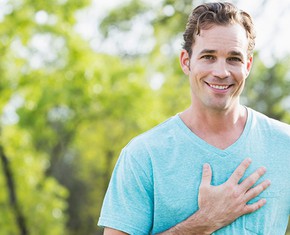The views expressed in our content reflect individual perspectives and do not represent the authoritative views of the Baha'i Faith.
As I prayed and praised the Creator on my pilgrimage, I reflected on the need to put me and my ego out of the equation and let God fully in.
One of Baha’u’llah’s Hidden Words expresses this idea better than I ever could:
O Son of Earth! Wouldst thou have Me, seek none other than Me; and wouldst thou gaze upon My beauty, close thine eyes to the world and all that is therein; for My will and the will of another than Me, even as fire and water, cannot dwell together in one heart. – The Hidden Words, p. 33.
There in the Holy Land, I started thinking about the importance of getting past my ego and the existence of a self independent from God. Another quote from the Baha’i teachings, which a friend has put to music, started playing in my head:
Release yourselves from this world’s life, and at every stage long ye for non-existence; for when the ray returneth to the sun, it is wiped out, and when the drop cometh to the sea, it vanisheth, and when the true lover findeth his Beloved, he yieldeth up his soul. – Abdu’l-Baha, Selections from the Writings of Abdu’l-Baha, p. 76.
As I continuously played this song in my mind, I started to really value that “longing for non-existence,” seeing it as the ideal spiritual state. Baha’u’llah describes it as the last step in the wayfarer’s journey to God, calling it “the valley of true poverty and absolute nothingness:”
This station is the dying from self and the living in God, the being poor in self and rich in the Desired One. Poverty as here referred to signifieth being poor in the things of the created world, rich in the things of God’s world. For when the true lover and devoted friend reacheth to the presence of the Beloved, the sparkling beauty of the Loved One and the fire of the lover’s heart will kindle a blaze and burn away all veils and wrappings. Yea, all he hath, from heart to skin, will be set aflame, so that nothing will remain save the Friend. – Baha’u’llah, The Seven Valleys, p. 35.
This “dying from self and the living in God” represents a state of consciousness that transcends the self and the ego. That is, when we forgot our self and fully focus on God, our behavior in this world will serve others—we will immerse ourselves like a drop in the sea of humankind, as the self and all its manifestations completely disappears when one swims in the sea of oneness:
Then we shall be inspired to upraise the standard of the oneness of humanity; we shall take a portion of the divine grace and become resplendent with the rays of the heavenly luminary; then the human race will mirror forth the attributes of the eternal kingdom and will move like a peaceful sea and each individual will appear as a wave. As we look upon the sea, we will comprehend it as the sea of God; as we look upon the waves, we will realize that they are the souls of humanity. The sun is one; all light is one; the rays are one; it shines on all. – Abdu’l-Baha, Divine Philosophy, p. 171.
I also found during my time in the Baha’i Shrines that this longing for non-existence directly related to my reliance on God. By acknowledging my own insignificance, my non-existence, I testified that God is the reason why anyone would accomplish anything, and that God stands in no need for anyone’s help—but that we all stand in need of His help.
In this state of longing to worship God, I yearned to be part of that ocean of God’s presence, where I could lose my identity, as a drop does in the sea, demonstrating my poverty and magnifying God’s bounty and riches. This then allowed me to appreciate the fact that my growth and closeness towards God entirely depends upon His good pleasure:
The tie of servitude established between the worshiper and the adored One, between the creature and the Creator, should in itself be regarded as a token of His gracious favor unto men, and not as an indication of any merit they may possess. To this testifieth every true and discerning believer. – Baha’u’llah, Gleanings from the Writings of Baha’u’llah, p. 193.
To think that I will always, on my own, define the right path towards God in all situations is like a lost child saying he can make wise decisions to find his parents. Obviously, we all need to make certain decisions to stay safe, but then we ultimately need to rely that the loving Father will find us and guide us throughout life. Acknowledging that our spiritual progress is entirely dependent on God’s will is the seed, which nurtured through longing for non-existence, leads us to His guidance. This allows the anxiety of being that lost child to give way to the eager anticipation for the moment of being found:
Ordain Thou for me, O my God, the good of this world and the world to come, and grant me what will profit me in every world of Thy worlds, for I know not what will help or harm me. Thou, in truth, art the All-Knowing, the All-Wise. – Ibid., p. 256.
I realized, during my pilgrimage to the Baha’i World Centre, that I will move through my entire life dusting away the self, hopefully progressing towards closer reunion and likeness with God. So, to see life’s progression as a process allows me to also approach life’s decisions in a learning mode. I am still learning, and developing, and hopefully my steps in this regard will allow me to make a better decision the next time I am faced with one. Or as one of my aunts used to say “use each mistake to learn how to make better ones next time.” Similarly, I discovered during my visit to the Holy Land that my pilgrimage was itself part of a process, and not a moment where all decisions had to be made.
You May Also Like
Comments

















I could not even look at the Shrine of the Bab when we were there until I finally had to face that Great Beauty when it was time for my family to visit the Shrine. The Dawnbreakers came back to me as the tears flowed and the glorious martyrdoms unfolded once more. Then, after a brief pause outside the room of The Bab, how peaceful and ...happy was the room of Abdu'l-Baha. And all was right with the world and my wife and child.